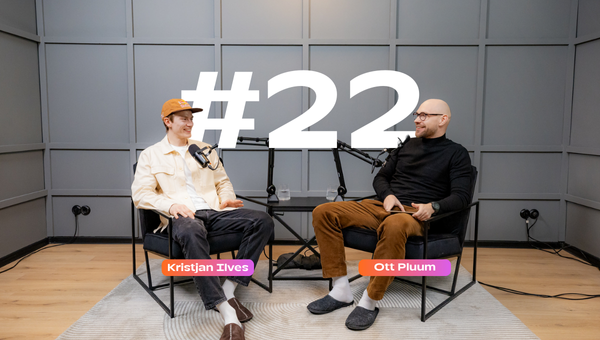Have you ever felt your goals slip away or your motivation disappear halfway? There could be many reasons for this, but according to sports psychologist and coach Jorgen Mats, it might not be the word “motivation” or the importance of the goal at all, but the steps you take to decipher the journey to your goals. Sometimes, perhaps, it’s even more about asking yourself the “why?” question.
To celebrate men’s health monthy we had a special guest on “Samm-sammult heaoluni!” podcast coach, sports psychologist and combat sports trainer Jorgen Matsi who chatted about men’s health, goal setting and the fierceness of combat sports.
Listen to the full episode on Spotifys or RSS.com.
The “Why?” question gives direction
Abstract threats of emergency in the future will not move people. To warn that something might happen in 20 years’ time because of nicotine or alcohol use seems distant enough not to heed the warning. The aim, says Mats, should be to bring the future me closer to myself, to use it as a driver to want to be a healthier person, for example.
If we can link exercise or nutrition to something else that is intrinsically important to us, it helps to put things into perspective. To do this, we could ask ourselves: why do we need this health? For some, health is no more back pain – for others, it might be the desire to be as fit in 20 years’ time as you are now.
If you can make that connection with everyday life, for example, I went to the gym yesterday and it makes it easier to feel good about myself, it makes it easier to keep going. But the general concern is that people agree that health is important, but often don’t think about the reasons why it’s important.
When people fail to get in shape for the New Year, start the January sober or achieve fitness goals for the summer, it is because they do not ask themselves “why” they need it. “Last summer I also went to the beach, I got by, social relations are good. Then there’s really no reason. Now, if you’re asking what to suggest to people that this kind of goal setting and focus on health can work better, then yes, there’s no point in blaming yourself and think to yourself why you need to be better somehow.”
Matsi adds that people also tend to take on too much of a burden, because people on social media are looking at how hard they are working out and saying how you can do it too, but when the speaker is a young personal trainer being watched by an older person, the resource is different and it’s worth sticking to the plan and being realistic about what you can actually do.
Motivation – a word with a broad definition that can mean anything and nothing at all
“I think it’s just not a very useful word – there’s a big problem with it, which is that when people talk to each other about motivation, it’s easy to get into a situation where, because it’s the same word, it feels like we’re talking about the same thing. But in fact, one person is thinking one thing, another person is thinking another.”
The problem is that the word “motivation” is often a description. It is said that there was simply no motivation. What does it mean? A person actually summarizes some environmental factors and feelings with it because it makes things easier, and they say, “Ah, I don’t know, I stopped some activity because I ran out of motivation.”
Instead, Matsi suggests the use of the word “driving force”, which is what makes you act in reality, the force that drives and ultimately determines how long it lasts or when it ends. “If we take the example of a workout and a friend says get off the couch and let’s go now, people will say yes, it’s easier to go. Then it’s not useful to think that now there’s motivation, but you can look at it like ahhaa – if the situation is that a friend says let’s go and then you go, then that friend is the important factor.” However, the use of the word ‘motivation’ does not seem to give any added value or additional information about it,” Matsi gives the example.
This kind of analysis will help you identify the environmental influences that you can use next time to achieve your goals.
Make goals tangible
According to Matsi, the goal itself is nothing more than simply a state of affairs in the future that is different from today. If there is a feeling of not being happy with oneself or a desire to change something, the impetus is already there. Now the question is how to formulate it into a goal.
This can be achieved, for example, with the ladder method, he says. Let’s say in a year’s time you want to run 10 kilometres without walking, the first thing you have to start with is whether it’s a realistic goal – you have to think about the training you have to do, how long it will take, and so on.
So it’s a good idea to set intermediate targets, like steps on a ladder, to run seven kilometres uninterrupted after six months, for example, and five kilometres after three months. If you have a two-week goal of, say, five kilometres in a run, that’s already close to a tangible goal, which will bring all the subsequent ones together. It will also help to feed back your progress better and faster – milestones will give you a reflection of your results and tell you whether or not your long goal is even realistic in that time.
If there are obstacles or problems with a short-term goal, it’s worth calmly reflecting on whether the one-year goal was exactly what was needed, or whether it makes sense to continue with the short-term plan, or milestone, in two weeks’ time because of holidays and travel, and end up running 10 kilometres in a year and two weeks.
“Targets as a tool are just like a feedback method, so that you can move back and forth in time and see if your current behaviour is in line with the long-term plan,” Matsi stresses.
It’s also important to think about how it went last time, says Matsi. If you’ve usually managed to put in three months of effort towards a goal, for example, and it always breaks down, the first question you should ask yourself is “why should this time be different?”. So you have to answer that and do something differently – if you do the same as before, it’s likely to go the same way.
Stress less, or for prosperity you don’t have to fill all the pockets at once
According to Matsi, people tend to put too much emphasis on over-optimizing and feeling bad, for example, if they haven’t been to the gym once this week and it feels like the end of the world. In reality, this kind of guilt and self-doubt is just a problem that brings the mood down and is destructive from the inside.
“I’m trying to let go of it for the moment, rather than resent myself if I get to the gym once a week, for example, or if my diet hasn’t been ideal. Considering I have three children and they are still relatively young and a lot of time is spent managing them, I’m trying to remind myself to go to bed a bit earlier rather than later and drink a glass of water more,” Matsi encourages a looser attitude towards herself.
Generally speaking, we see that guilt is not a good driving force, and all it does is make you feel more miserable. It doesn’t actually help to initiate the behaviour that a person would want. “I’m more in favour of doing what you can in the moment and not worrying about the pastry you ate. For most of us, cinnamon rolls taste good with a nice cup of coffee – never mind that it’s not optimal in terms of health, so to speak, but in terms of mental health, it can be really important that I take that spare moment where I sit for 10 minutes, look out of the window in peace and maybe share that cinnamon roll with someone who’s dear to me. These things are much more important than whether or not the cinnamon roll fit in your macros,” consoles Matsi.
Listen to Stebby’s “Samm-sammult heaoluni!” podcast conversation with Jorgen Matsi abour men’s health, goals and the awesomeness of combat sports – on Spotify or RSS.com.
Find over 8500 ways to help your well-being on Stebby.






